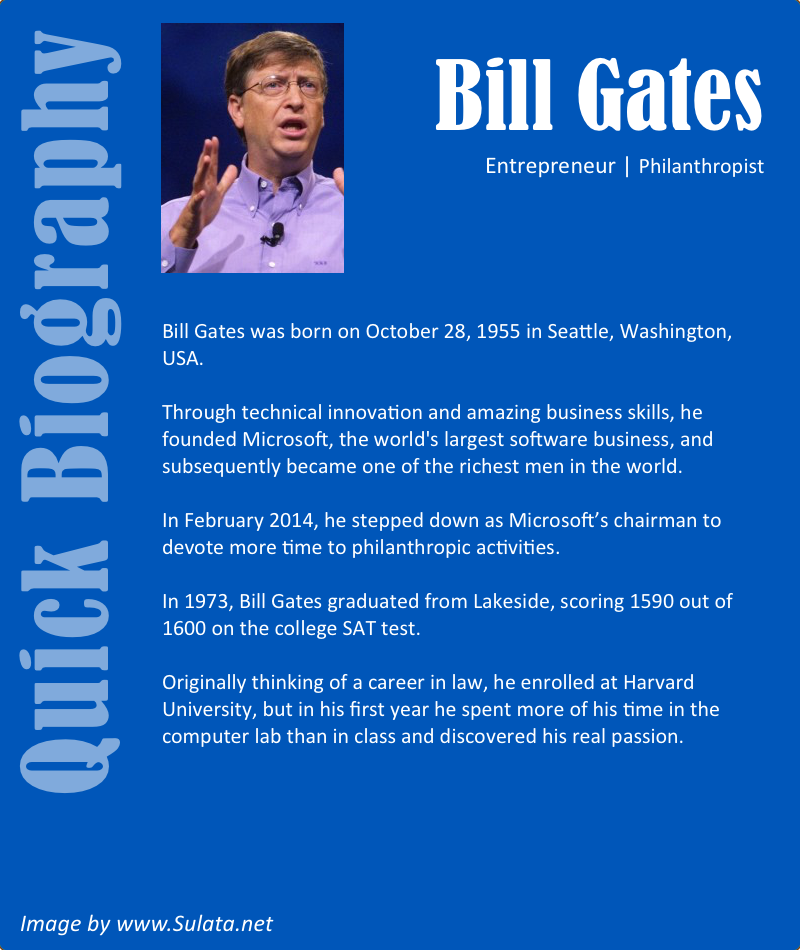Bill Gates, a name synonymous with technology and philanthropy, has had a profound influence on the world through his innovations and charitable initiatives. Understanding his educational journey is crucial to appreciating how he became one of the most influential figures in modern history. In this article, we will delve into the educational background of Bill Gates, exploring how his early experiences shaped his future endeavors. From his time at Harvard University to his relentless quest for knowledge, Gates’ educational path is a testament to his commitment to innovation and improvement.
Born on October 28, 1955, in Seattle, Washington, William Henry Gates III, known to the world as Bill Gates, displayed an exceptional affinity for technology and learning from an early age. His passion for computers began in his school years, where he was introduced to programming. This early exposure laid the foundation for his future pursuits in technology and entrepreneurship. Through his educational experiences, Gates not only honed his technical skills but also developed a vision that would ultimately lead to the establishment of Microsoft, a company that revolutionized the software industry.
This article will explore the key stages of Bill Gates' education, the institutions he attended, and the pivotal moments that shaped his character and career. We aim to provide a comprehensive overview that not only highlights his academic achievements but also illustrates the values and principles he embraced throughout his educational journey.
Table of Contents
- Early Years and Interests
- High School Education
- Harvard University
- Founding Microsoft
- Lifelong Learning
- Philanthropic Initiatives
- Impact on Education
- Conclusion
Early Years and Interests
Bill Gates was raised in a supportive family that encouraged intellectual curiosity. His early education took place at Lake Side School, a prestigious private school in Seattle. Here, he was exposed to various subjects, but his interest in mathematics and science stood out. Gates began programming computers at the age of 13, a skill that would define his career.
Key Influences During His Early Years
- Access to a computer at a young age
- Supportive family environment
- Encouragement from teachers
High School Education
During his high school years, Gates excelled academically and became involved in various extracurricular activities. He co-founded a computer programming club, which allowed him to collaborate with peers and further develop his skills. His passion for technology grew, and he began to envision a future in the software industry.
Achievements in High School
- Graduated with honors
- Participated in math competitions
- Developed early software programs
Harvard University
In 1973, Bill Gates enrolled at Harvard University, where he pursued a degree in mathematics and computer science. During his time at Harvard, Gates continued to explore his passion for technology, often spending late nights coding and developing software. Despite the rigorous academic environment, he found time to work on entrepreneurial projects.
Pivotal Moments at Harvard
- Met Steve Ballmer, who would later become CEO of Microsoft
- Developed key software ideas that laid the groundwork for Microsoft
- Realized the potential of software in transforming business
Founding Microsoft
In 1975, Gates made a life-changing decision to drop out of Harvard to pursue his entrepreneurial ambitions. He co-founded Microsoft with Paul Allen, and together they revolutionized the software industry. Gates’ educational background played a significant role in shaping his vision for the company, allowing him to create innovative products that catered to the needs of users worldwide.
Impact of Education on Microsoft’s Success
- Application of mathematical principles in software development
- Understanding of programming languages
- Ability to identify market needs and trends
Lifelong Learning
Throughout his career, Bill Gates has emphasized the importance of lifelong learning. He has continually sought knowledge beyond formal education, reading extensively and attending conferences to stay updated on industry trends. Gates believes that education is a continuous process and has encouraged others to adopt a similar mindset.
Strategies for Lifelong Learning
- Regular reading of books and articles
- Engagement in discussions with experts
- Participation in online courses and seminars
Philanthropic Initiatives
In addition to his contributions to technology, Gates is known for his philanthropic efforts through the Bill & Melinda Gates Foundation. The foundation focuses on global health, education, and poverty alleviation, demonstrating Gates’ commitment to using his wealth and influence to make a positive impact on society. His educational initiatives aim to improve access to quality education for underprivileged communities.
Educational Initiatives by the Foundation
- Funding for educational scholarships
- Support for innovative teaching methods
- Collaboration with educational institutions for reform
Impact on Education
Bill Gates’ influence extends beyond technology into the realm of education. His foundation has funded numerous projects aimed at improving educational outcomes, particularly in low-income areas. Gates advocates for data-driven approaches to education, emphasizing the need for measurable results and accountability.
Notable Contributions to Education
- Investment in teacher training programs
- Support for research on effective educational practices
- Promotion of technology integration in classrooms
Conclusion
Bill Gates' educational journey has been marked by a relentless pursuit of knowledge and innovation. His experiences at Lake Side School and Harvard University, combined with his entrepreneurial spirit, laid the foundation for his success in the technology industry. As a philanthropist, Gates continues to champion education, advocating for reforms that aim to create equitable opportunities for all. By sharing his story, we hope to inspire others to embrace lifelong learning and contribute positively to society.
We invite you to share your thoughts in the comments below, explore related articles on our site, and join us in celebrating the legacy of Bill Gates.
Thank you for reading, and we hope to see you again soon!


